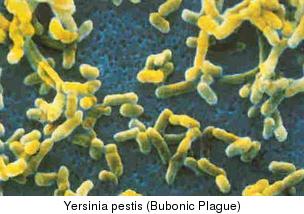 Researchers publishing in the Proceedings of the National Academy of Sciences found that a rise of just 1.8 degrees Fahrenheit in the springtime temperature led to a 59 percent increase in plague prevalence (currently, up to 3,000 cases are reported each year around the world). The researchers focused their study in Kazakhstan, where the primary host of the plague is the great gerbil (no, really). The gerbils carry fleas, which carry the bacterium Yersinia pestis, which causes the plague, which gets transmitted to humans by the fleas. Yersinia likely triggered both the Black Death, which killed more than 20 million people in the Middle Ages, and a 19th century pandemic in Asia that killed tens of millions. Depressingly, both outbreaks occurred during warm, wet climatic periods.
Researchers publishing in the Proceedings of the National Academy of Sciences found that a rise of just 1.8 degrees Fahrenheit in the springtime temperature led to a 59 percent increase in plague prevalence (currently, up to 3,000 cases are reported each year around the world). The researchers focused their study in Kazakhstan, where the primary host of the plague is the great gerbil (no, really). The gerbils carry fleas, which carry the bacterium Yersinia pestis, which causes the plague, which gets transmitted to humans by the fleas. Yersinia likely triggered both the Black Death, which killed more than 20 million people in the Middle Ages, and a 19th century pandemic in Asia that killed tens of millions. Depressingly, both outbreaks occurred during warm, wet climatic periods.Hmm, warm wet climate ... sounds familiar.

No comments:
Post a Comment